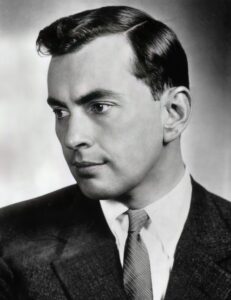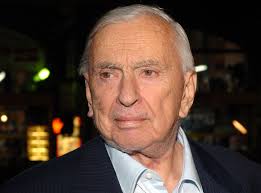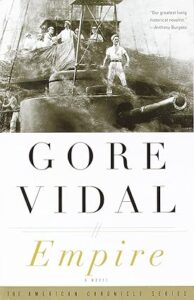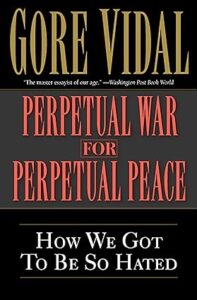Gore Vidal, who passed away in 2012 at the age of 86, was a literary icon known not only for his wit and elegant prose but also for his bold politics.
While many knew him as a novelist, screenwriter, and media personality, few recognized his deep populist and nationalist convictions.
In this post, we honor Vidal as a writer who defied political categories and spoke uncomfortable truths—often to the dismay of both conservatives and liberals.
A Nationalist Voice from an Unexpected Source
Despite his aristocratic background and elite connections, Vidal stood as a genuine nationalist and populist.
He was celebrated globally as a bestselling author, especially for his gripping historical novels.
Yet, later in life, he began to speak more directly about controversial political issues.
Always articulate and confrontational, Vidal made waves with his open opposition to war, imperialism, and federal overreach.
His fierce criticism of Israel and its U.S. lobbying arm cemented his reputation as one of the most provocative voices in modern American letters.
For a deeper look at the authors and ideas that helped shape my nationalist worldview, see Books That Shaped My Nationalism and Rejected Globalism.

A Liberal Who Refused to Follow the Script
Vidal’s unapologetic views often baffled his critics.
Though he identified as a liberal, his positions often mirrored those found in American Free Press and similar independent populist media.
Some may take issue with the praise for Vidal due to his self-declared atheism or his homosexuality.
However, even on those matters, Vidal refused to follow mainstream activist agendas, often clashing with gay rights groups.
Regardless of his personal life, his writing reflected a deep respect for traditional American nationalism.
This worldview was largely influenced by his uncle, Senator Thomas Gore of Oklahoma, a well-known populist leader.
Vidal’s Ties to the America First Tradition
Vidal’s connection to populism ran deep.
As a student at Phillips Exeter Academy in 1940, he chaired the local unit of the America First Committee.
This group, wrongly smeared as isolationist or anti-Semitic, promoted the belief that U.S. military power should not be used to impose democracy worldwide.
Many readers missed the underlying nationalist messages in Vidal’s novels, but they were intentionally woven throughout his stories.
His family, Vidal once said, had always believed in keeping America out of unnecessary foreign entanglements.
To understand why true American nationalism must reject foreign wars, read Why Real American Nationalism Opposes Imperialism and War.
Vidal’s Empire Series: Novels with a Purpose
Gore Vidal’s historical novels, which he called his “narratives of empire,” include a series of works that present a powerful populist message wrapped in compelling storytelling.
These books feature recurring characters across generations, set against pivotal moments in American history.
Here are four key titles in the series:
-
Empire (Random House, 1987): Covers 1898–1907, as America began expanding its imperial reach.
-
Hollywood (Random House, 1990): Focuses on 1917–1923, showing how cinema began shaping public and political thought.
-
Washington, D.C. (Little, Brown, 1967): Explores 1937–1952, a time when the America First movement reached its peak.
-
The Golden Age (Doubleday, 2000): Ties together the events of 1939–1954 and serves as the conclusion to his narrative arc.
These novels are fast-paced and politically potent, ideal for readers seeking historical fiction with substance.
Vidal’s Nonfiction: A Patriot’s Critique of Empire
Gore Vidal didn’t reserve his political views for fiction alone.
He also published several collections of essays and nonfiction works that took direct aim at the military-industrial complex and U.S. foreign policy.
Noteworthy titles include:
-
Perpetual War for Perpetual Peace (Nation Books, 2002)
-
Dreaming War: Blood for Oil and the Cheney-Bush Junta (Nation Books, 2003)
-
Imperial America: Reflections on the United States of Amnesia (Nation Books, 2005)
-
The Decline and Fall of the American Empire (Odonian Press, 2002)
-
The Last Empire: Essays 1992–2000 (Vintage, 2002)
These volumes address topics such as Waco, Ruby Ridge, Oklahoma City, 9/11, and the deep state. They remain essential reading for anyone concerned with liberty and truth.
Daring to Question the Official Story
Vidal stood almost alone in challenging official narratives around 9/11 and the Oklahoma City bombing.
He questioned whether Timothy McVeigh acted alone and asked tough questions about what U.S. officials knew before the attacks of September 11.
In one essay on 9/11, Vidal even cited an article from American Free Press—a fact that would surprise many mainstream observers.
He believed that patriotic Americans had the right, and even the duty, to ask questions others were afraid to raise.

Attacked for Speaking Truths
Vidal was labeled an anti-Semite by critics, especially for questioning neoconservative voices like Norman Podhoretz.
He was not afraid to ask whether Podhoretz prioritized Israeli interests over American ones—a line of inquiry that cost him dearly in elite circles.
Yet, despite the backlash, Vidal never backed down. His work stood as a challenge to the binary mindset that divides Americans into conservative or liberal camps.
He believed that true patriots think independently.
A Legacy of Courage and Clarity
Gore Vidal’s writings—both fiction and nonfiction—reflected a deep commitment to the America First tradition.
His fierce independence, sharp intellect, and unwillingness to conform made him an essential figure in American letters.
You may not agree with everything he wrote.
But his willingness to speak uncomfortable truths, in language anyone could understand, is exactly why his work still matters.

If you’re new to these ideas, check out Understanding Populism and Nationalism in America for essential context.
Final Thoughts: Honoring the Unconventional Patriot
Gore Vidal proved that it’s possible to emerge from elite circles and still stand for the people.
His ideas challenged the warmongers, the media gatekeepers, and the two-party system itself.
Thanks to writers like Michael Collins Piper, Vidal’s populist voice continues to reach new generations of readers—who may find that they agree with far more than they expected.
Explore Gore Vidal’s bold populist legacy, from historical novels to sharp critiques of empire, war, and the establishment left-right divide.


